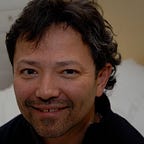Existence 1
Review of Concepts Relevant to Deleuze
Kierkegaard
Søren Kierkegaard laid the foundations of what later became known as “existentialism.”
Kierkegaard’s thought was in large part a reaction to Hegel’s philosophy based on the abstract unified concept. Kierkegaard asserted that abstractions do not exist, that we invent them in order to make connections in the world.
For Kierkegaard, only individual things exist, and this is particularly true of human beings:
The self is a relation that relates itself to itself… (The Sickness Unto Death)
The subjective, personal perspective of the individual human being is the only perspective that matters when it comes to ethical questions.
Ethical questions are essentially first person and we cannot resolve them by making reference to impersonal, objective reasoning.
The Subjective Passionate Will
Kierkegaard posits that human life is subjective, and through the choices we personally make in life, we create our lives and become ourselves.
We become individuals by engaging our personal will in making choices and commitments.
The singularity of the individual is the passion that he or she brings to choices and commitments, which involves a leap of faith to “become what one is.” (Philosophical Fragments)
For Kierkegaard, it is impossible to exist without passion, the subjective attitude I bring to the objective uncertainty of my existence in the world.
The human world, the crowd, is untruth, indifference, conformity. To exist is to be confronted with the question of meaning, and all I can bring to bear is the engagement of my subjective will.
Nietzsche
Some of this connects with Nietzsche, and his understanding of nihilism as the objective moral point of view.
For Nietzsche, like Kierkegaard, the moral crowd is untruth, ressentiment, bad faith, behind which stands nothing.
The will to power is all that there is, and nihilism brings with it the opportunity to rediscover our will to power and thereby create meaning in our lives.
How I do things is the only norm, my affirmation of life, my going to the limit of what I am capable of despite lack of an objective meaning in life.
The only meaning in life is my style, which is the only norm for the singularity of my existence:
My life as a work of art in which I create meaning and value.
I hope you enjoyed this article. Thanks for reading!
Tomas
Please join my email list here or email me at tomas@tomasbyrne.com.
Excerpt from my forthcoming book, Becoming: A Life of Pure Difference (Gilles Deleuze and the Philosophy of the New) Copyright © 2021 by Tomas Byrne. Learn more here.
